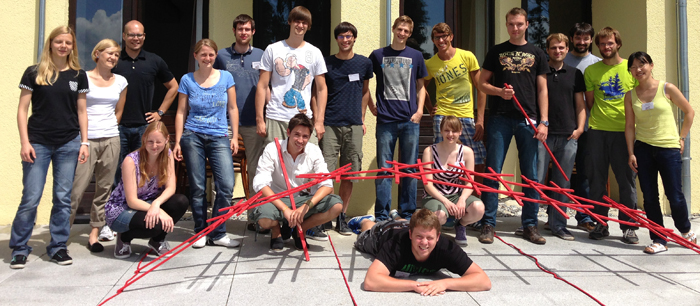The SFB1032 (MGK) Summer School 2013 in Überlingen
Read the article about the summer school
13.08.2013
At the end of July 2013, the first summer school took place for the SFB1032 graduate program (MGK: Modul Graduiertenkolleg).
Early on a Monday morning, 19 PhD students gathered in Munich to take a bus ride to Überlingen through the first rain of the month. They were rewarded with a delicious lunch on the beautiful hotel terrace with a breathtaking view over the Bodensee (Lake Konstanz).
There they met the two softskill trainers for the next days: Matthias Beckmann from Sprachraum and Tim Korver from Tim Korver – Individual English Training. Matthias and Tim were hired to train the PhD students in presentation skills. The first one and a half days were spent on an intensive course. Each of the PhD students had to prepare a talk about his/her research topic beforehand and bring it to the summer school. The participants could either choose a course in German (Matthias Beckmann) or in English (Tim Korver).
Matthias Beckmann and group Tim Korver and group
In the presentation skills courses the PhD students not only learnt how to find a concise and meaningful title for the talk, how to deliver a catchy introduction that captures the audience’s attention straight away, but also how to prepare a well-structured talk without getting lost in too much detail. They were also taught about some of the “finer details”, in particular which transitions are available instead of using “and then” again and again. In addition, the participants were trained in preparing different talks for different audiences. A talk for researchers from your own field should be different to a talk for non-experts.
Apart from that, all participants were videotaped during the seminar whilst giving their talk introductions. This is an invaluable technique as you can see yourself doing things you never realized before, like using a lot of “ums” and “ähms” or moving your hands uncontrollably. It is easier to work on your own mistakes once you have seen yourself doing them.
Special emphasis was put on the topic, “How to cope with difficult situations/questions”. What do you do when someone asks you a difficult, an irrelevant or even an aggressive question? The participants were “grilled” with questions in front of the audience one after the other. They could gain some insights of how to answer irrelevant questions appropriately, to filter out the main part of a long and difficult question and not to let someone corner you with an aggressive question.
After one and a half days of concentrated work on improving their presentation skills, the students all gathered for the group building event. Although some of the students had known each other before the summer school, everyone got to know their fellow group participants through the workshop. Now it was time to get to know each and every one of the summer school participants. To do that, Matthias and Tim had prepared something special. The students were put into two teams and were instructed to build a bridge out of red sticks that was able to support itself. It only took them 20 minutes to figure out the trick and they proudly gathered around the bridge for a fantastic group picture.
After that the group grabbed the chance to enjoy the perfect location and went to the Bodensee for some group-building free-time activities - relaxing, chatting and swimming. Later the group gathered again for the first round of the talks.

To follow the concept of the summer school to achieve the highest output of the presentation skills courses, the first speaker was Fabian Baumann talking about “Force-fluorescence spectroscopy in zero-mode waveguides” from Matthias’ group, followed by Mario Teichmann talking about “Molecular cascades on DNA origami” from Tim’s group. Matthias videotaped Fabian’s talk, made notes and after his talk, during Mario’s talk, he gave him 20 minutes of feedback. Then Matthias and Fabian returned to the seminar room and Matthias did the same with Jonathan List, Mario’s follow-up speaker, talking about “Plasmonic membrane bound DNA Origami nanoarrays”. Tim was outside during Jonathan’s talk giving Mario feedback on his talk. With this order of the talks, each speaker received a thorough analysis of his/her presentation and could watch it on video. Apart from that, the whole audience also filled in feedback forms, so the speaker did not only recieve feedback from the coaches, but also from the whole group. And the speakers received their video presentations on a stick so they could review it at home if they wanted to.
The talk sessions clearly showed the full range of the SFB1032 with topics from single molecule studies to the migration behavior of living cells. The students remained interested in asking questions to the speakers making each session lively and productive.
A big thank you goes to the participants for always being attentive and ready and happy to work despite the long hours. The coaches, Matthias and Tim: We really appreciate that you put the concept of the summer school into action in such a captivating and effective way. Thank you not only for your hard work but also for being part of the group. This summer school would not have been possible without the never ending dedication and work of the SFB1032 Student Representatives Florian Thüroff, Fabian Wehnekamp and Mario Teichmann. Their ideas, plans and organisation made the summer school absolutely unique.



